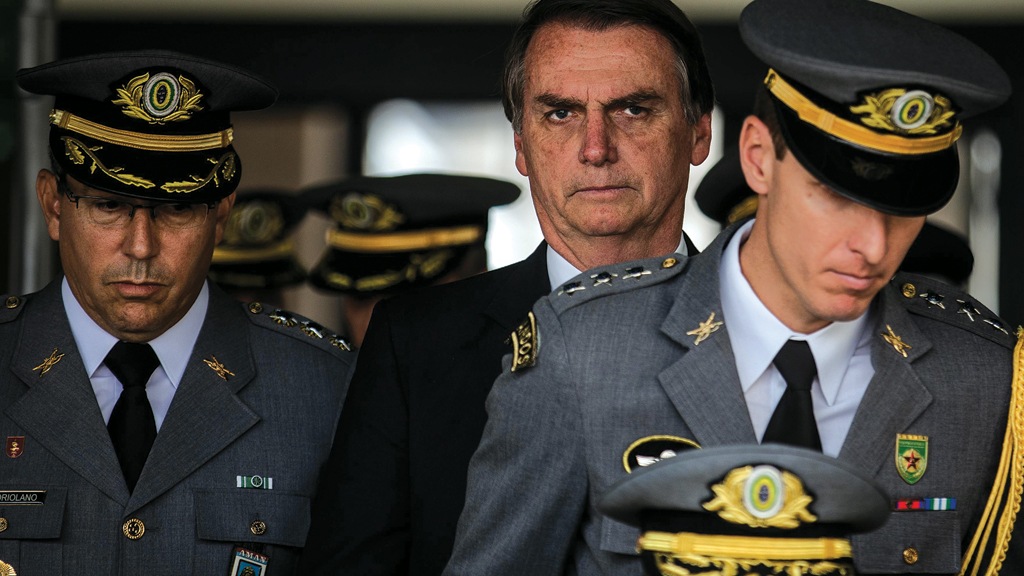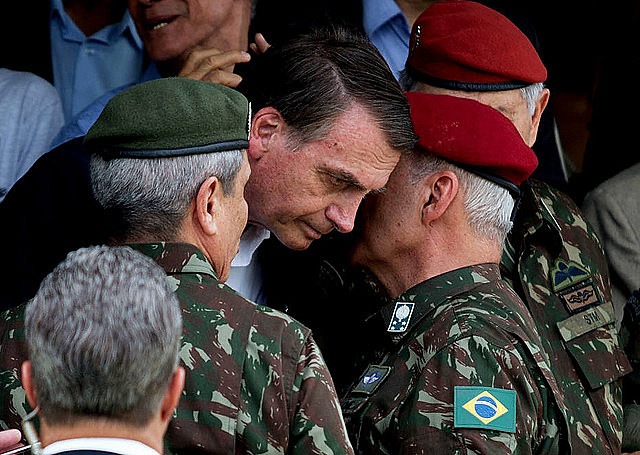RIO DE JANEIRO, BRAZIL – President Jair Bolsonaro will increase the presence of military officials in key positions in second and third echelon patronage positions, in order to mitigate the admission of political nominees from the so-called Centrão (a congressional bloc of center and center-right parties).
The hard core at the Planalto Palace – the military officers and the President’s sons – is designing a government based on that of the Armed Forces.

Since the first frictions with former Minister of Health Luiz Henrique Mandetta, Bolsonaro has made clear his dissatisfaction with part of several Ministry occupants, whom he referred to as stars.
Sérgio Moro’s early withdrawal from Justice has expedited the plan to reform the cabinet for the post-crisis pandemic of the novel coronavirus. To this end, Bolsonaro will firmly root himself in those he trusts, the military.
Today, the uniformed members control eight of the 22 Ministries and hold 1,349 positions in Executive branch departments. This does not include a further 881 positions held by members of the three forces in the Ministry of Defense.
In addition to retaining Generals in three of the Planalto’s four portfolios, new officials will be assigned to strategic positions in ministries to help contain a future crisis.
The Ministry of Infrastructure, which is in on the Centrão’s sights, is expected to host new military officials to key positions, such as in companies linked to the ports.
The assessment within the portfolio is that some companies in the Northeast will be assigned to the new government allies. However, these positions will be reinforced with military officials.
Bolsonaro also signaled to advisors that he wants more names from the Armed Forces in the Ministry of Justice. The portfolio began to be led on Thursday, April 30th, by former Solicitor General of Brazil (AGU) André Mendonça, after Moro’s resignation. The President is analyzing whether to excise Public Safety from the portfolio’s bailiwick, but until that happens, he wants to see other military officials in the sector.
With Moro’s departure, the re-creation of the portfolio was again discussed; it could end up either in the hands of the PP (Progressives) party, which has already shown interest, or in those of an old ally: former deputy Alberto Fraga (Democrats), loyal to the President and with good standing within the Centrão.
Currently, the only military officer remaining in from Moro’s administration is the National Secretary of Public Safety, General Guilherme Theophilo.
The first to receive the Bolsonaro-style management shock was the Ministry of Health. General Eduardo Pazuello, appointed by the President himself, took over the portfolio’s Executive Secretariat, the second most prominent Health post in the country, to help newly appointed Minister Nelson Teich.
The transition between Mandetta and Teich had already been conducted by another military man, Rear Admiral Flávio Rocha. He is head of the SAE (Special Affairs Secretariat), linked directly to the Presidency. Two other military names may ascend to the post in coming weeks.
In the president’s view, the presence of the uniformed contingent will prevents what bothers him most: insubordination and protagonism.
Bolsonaro’s aides advocate a progressive change in the team, drawing power from the so-called “classic politicians” and even from some stars such as Minister of Economy Paulo Guedes.
Recently, Guedes clashed with the military core – particularly reserve generals Walter Braga Nett, Minister of State Chief of Staff of the Presidency and Secretary of Government Luiz Eduardo Ramos – when he disagreed with ‘Pró-Brasil’ (‘Pro-Brazil’), an infrastructure plan designed by the military to reactivate the economy in the post-crisis period.
However, Guedes seems to retain power in the government because he is now Bolsonaro’s main ministerial backer. To allies, the President says he has a personal appreciation for Guedes.
The fact that Bolsonarist entrepreneurs supported his name at a lunch with the President in the Planalto on Wednesday, April 29th, seems to be weighing in favor of the Minister of Economy.
The military core has momentarily pulled back from its onslaught on Guedes, but continues to argue to Bolsonaro that the crisis is a time to raise spending, not saving. The President, for the time being, told allies that it would be risky to lose two of the government’s main pillars at the same time.
The changes should impact one of the few political allies who were part of Bolsonaro’s hard core during the campaign – Onyx Lorenzoni, today at the head of the Ministry of Citizenship. Onyx fell out of favor with the President.

Unable to be the political articulator that Bolsonaro wanted in the government when he was Chief of Staff of the Presidency, Onyx brought new unnecessary attrition to the government by announcing that he would pay two installments of aid to victims of Covid-19, even with no cash available.
His management in the crisis has been criticized by the military and the President’s sons, who do not have the same faith in the Minister as the President himself. Bolsonaro used a live broadcast to explain himself to the population and demanded that Braga Netto scold Onyx.
Some ministerial space must be preserved for the ideologists, to sustain the complacency of Bolsonarist militants and the President’s sons, in specific areas such as Women, Family and Human Rights, with Damares Alves, and Foreign Relations, with Ernesto Araújo.
The only one who could lose such space is Abraham Weintraub, in Education. The Minister has been suffering erosion since last year and the portfolio is coveted by all of the Centrão’s member parties. However, the current policy of the Ministry is not expected to change.
Rogério Marinho from Regional Development, who recently moved closer to the military and is securing some posts in the cabinet for the Centrão, is expected to remain for the time being.
Marinho’s moves have been perceived as a lifeline after he clashed head-on with Guedes over the ‘Pró-Brasil’ plan.

